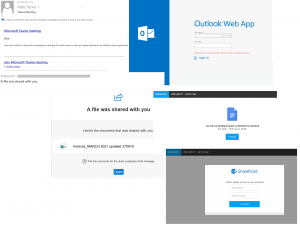
Cyber criminals use WhatsApp and information about parcel deliveries to spread spam and phishing emails. There was a slight increase in spam emails in the second quarter of 2021. This is confirmed by a spam analysis by Kaspersky for Q2 / 2021.
Since last year, cyber criminals have been taking advantage of delivery delays and outages to trick users into opening malicious email attachments and links. This trend continued into the second quarter of this year, but online fraudsters continued to develop their methods and became more adept and precise at sending spam emails with greater local relevance. In addition, they increasingly used current discussions about WhatsApp to lure their victims into the trap. After a prolonged decline, the share of spam in global e-mail traffic began to grow again in the second quarter of 2021 and averaged 46,56 percent, an increase of 0,89 percentage points compared to the previous reporting period. These results come from the latest spam and phishing report from Kaspersky.
Spam and phishing report shows ranking
Users saw an increase in spam emails related to package deliveries in the second quarter. These ranged from money inquiries to customs matters and shipping costs. Users were redirected to fake websites that not only ran the risk of losing money, but also personal data or credit card information.
Cyber fraudsters also created websites that fooled users into buying items that could not be delivered to the original recipient. These websites were designed like a lottery: the buyers had no information about the content, the price was based on the weight of the alleged package - but these were never delivered after the purchase.
Spam scams with WhatsApp as bait

Cyber criminals often forge emails as if they came from cloud services. But they don't want to steal the account, they want to steal money (Image: Kaspersky).
Cyber criminals increasingly used WhatsApp as a cover for their spam campaigns. Messages were sent via WhatsApp asking for small amounts of money. Different scams were used: On the one hand, the recipients were asked to take part in a survey via WhatsApp and send several messages to their contacts in order to win a prize. On the other hand, it was announced that they had already won something and could pick up the prize for a small fee.
Cyber criminals also took advantage of the debate about WhatsApp's new privacy settings, which enable information to be exchanged between Facebook and WhatsApp. To do this, they created fake websites that invited users to communicate with supposedly attractive strangers on WhatsApp. However, when users clicked the chat link, they were redirected to a fake Facebook log-in page where they were supposed to enter their personal information. Users also received links to fake WhatsApp messenger apps in which they downloaded malware.
Spam and phishing are the most successful weapons of attack
“As in the past, attackers can be seen taking advantage of current events to steal money and data, whether it's growing messenger users or ongoing problems with mail delivery during a pandemic,” said Tatyana Shcherbakova, Senior Web Analyst at Kaspersky. “Spam and phishing are still the most effective methods to successfully launch attacks because they target human emotions. Users should be wary of unexpected e-mails and never open e-mail attachments or click on links - for the latter, go directly to the website."
Germany's place in the global spam comparison and other results
- The countries from which spam attacks came were unchanged from the first quarter. Russia (26,07 percent) is still in first place, followed by Germany (13,97 percent) and the USA (11,24 percent).
- Most malicious attachments were found in Spain (9,28 percent). Italy (6,38 percent) kept second place, followed by Russia (5,82 percent) and Germany (5,26 percent).
- Corporate accounts continued to be one of the most tempting targets for cyber criminals. To increase the credibility of links in emails, they imitated mailings from popular cloud services such as Microsoft Teams.
- Fraudsters continued to use the topic of pandemic-related compensation. Offers of financial help were mostly sent on behalf of alleged government agencies. Attempts to make use of the promised payouts, however, only resulted in loss of money or compromised bank card details.
More at Kaspersky.com
About Kaspersky Kaspersky is an international cybersecurity company founded in 1997. Kaspersky's in-depth threat intelligence and security expertise serve as the basis for innovative security solutions and services to protect companies, critical infrastructures, governments and private users worldwide. The company's comprehensive security portfolio includes leading endpoint protection as well as a range of specialized security solutions and services to defend against complex and evolving cyber threats. Kaspersky technologies protect over 400 million users and 250.000 corporate customers. More information about Kaspersky can be found at www.kaspersky.com/
